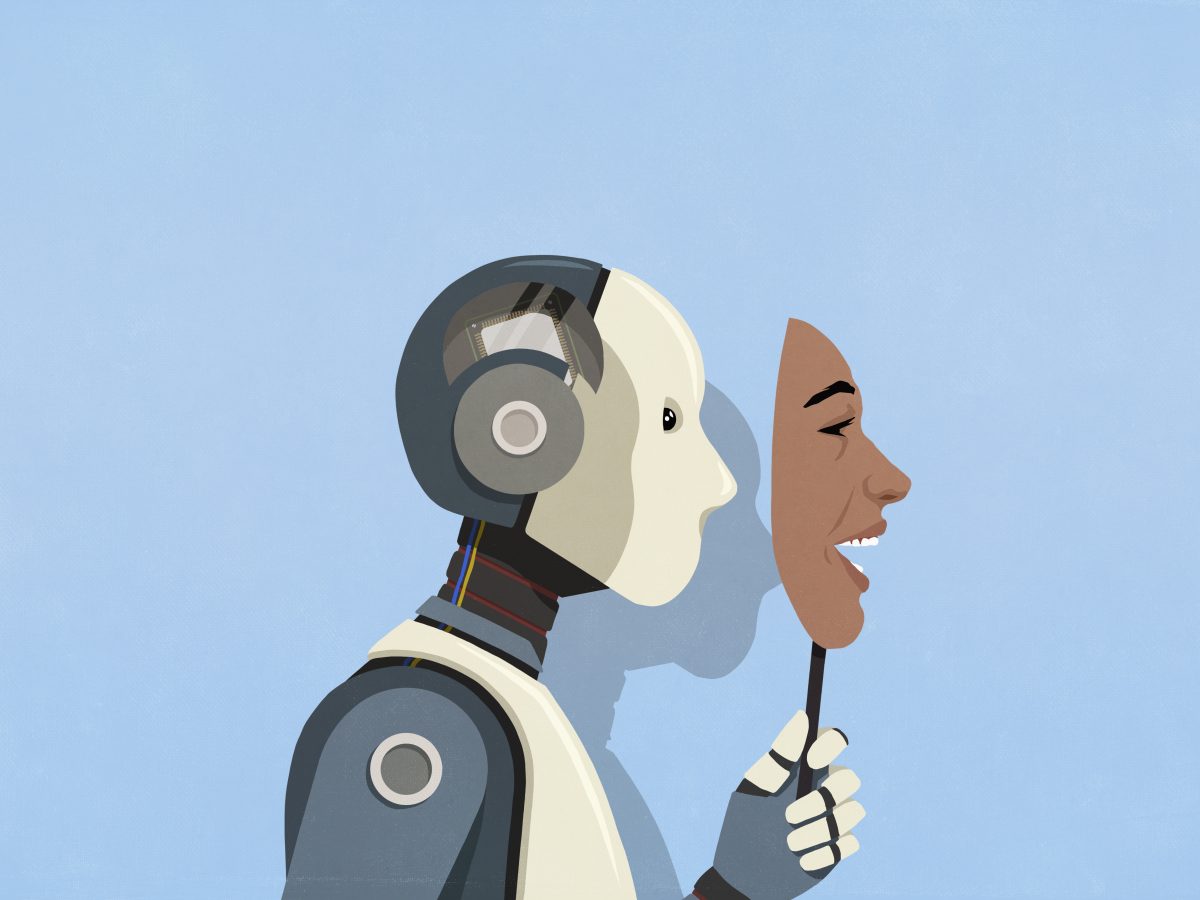
Apparently, AI is becoming a modern-day minstrel show.
If you’re not fully aware of the situation, a plethora of AI-generated videos has surfaced in recent months—and they’re sparking well-deserved outrage. These videos aren’t considered friendly or light-hearted. They are downright exploitative and dangerous. The main target? Black female content creators—well, Black women in general.
In a video uploaded by social media user @rahsh33m, a woman is seen sitting in a dim-lit room with a plate of fried chicken in front of her. She speaks to her audience about “cutting off a friend who missed your birthday dinner, but not the man who forgot your birthday.” Notice anything? After quoting this, she scarfs down a whole chicken drumstick—bone and all. The video isn’t real. It’s AI-generated.
Another video that has drawn major attention features a sea of gorillas using African American Vernacular English (AAVE), wearing lace fronts and long acrylic nails. The term “bigfoot baddie” originated from that video. Millions have weighed in with opinions. Most are upset that AI platforms are enabling the creation of content that harms an entire community. Others argue that social media behavior plays a role in how AI mimics Black mannerisms. The debate continues to unfold.
These aren’t isolated incidents. Thousands of AI-generated videos are now replicating harmful stereotypes about Black women. From the “baby daddy” trope to Miami trips for BBLs, these videos reinforce elevated levels of discrimination. Initially, AI-generated content seemed harmless—think baby filters and “blast to the future” trends. Now, it’s taken the concept of a meme to a disturbing new level.
Michelle Mitchell, a content creator herself, believes these videos are misleading and harmful, especially to Black women, as they mock them in ways that mirror outdated, degrading caricatures. “These aren’t accidents—they’re algorithms trained on biased data that recreate centuries-old caricatures with a modern and more dangerous face,” Mitchell says. “The viral AI-generated videos that depict Black women in stereotypical, exaggerated, or animalistic ways aren’t just tone-deaf, they’re digital minstrelsy.”
For decades, Black people have been used as props for mockery and exploitation—through Coon cards, reality shows, parodies, and now AI. It also raises concerns around how social media users’ data have made their way into the hands of AI companies. This data is now being used to create these heinous digital portrayals, with little recourse available to those affected.
In today’s culture, AI stands as one of the most powerful and widely-used technological tools. It continues to evolve rapidly, with the ability to replicate humans more accurately through advanced algorithms and vast data sets. Everything posted online becomes data—data that is tracked, scraped, and used without our consent.
Candiace Scarborough, director of cybersecurity and software engineering at Parsons Corporation, shared her experience creating an AI-generated promo for her podcast. She saw the bias firsthand. “Every Black woman image the system returned was overexaggerated—none of them looked like a tech executive or podcast host,” Scarborough said. “We’re either invisible in AI or turned into a stereotype. There’s no in-between, and that’s precisely the problem.”
The harm caused by racially insensitive videos goes deeper than mere offense. It reflects the deeply rooted issues of misogynoir and cultural trauma. These portrayals distort the authenticity of Black creators, many of whom use their platforms to uplift, educate, and empower. What we are witnessing is a digital form of blackface—and it’s damaging no matter how it’s framed.
With the rise of AI-generated influencers, the impact on the creator economy could be significant. According to a report by Epidemic Sound, the creator economy is projected to reach $528 billion by 2030. AI is among the key trends driving this growth. While some view it as a tool for innovation, there’s growing concern that AI is slowly replacing human-created content and devaluing authenticity. Scarborough warns that Black content creators are likely to be hit hardest.
“This will disproportionately harm Black creators, who are already marginalized in the algorithm. We’re also seeing how AI systems used in financial services disproportionately flag Black or Brown users for fraud due to biased data,” she says. “The creator economy could end up being driven by simulations of Blackness, while the real people behind the culture are left out of the profit loop.”
Mitchell echoes the sentiment: “Brands looking for ‘safe’ representation may turn to AI avatars they can fully control, without needing to pay or negotiate with real Black creatives. That strips income, opportunity, and visibility from Black women in the creator economy.”
What happens next? Honestly, the fight will be draining.
Education remains a key part of addressing these problems—especially when they stem from a lack of acknowledgment and systemic racism. AI companies must begin to implement meaningful diversity efforts and ethical safeguards in their technology. With real change, biased algorithms can be dismantled and broader, more accurate representation can take shape.
Mitchell emphasizes the importance of inclusion at every stage of development: “The need to hire and listen to Black women at every level—from dataset design to UX. They must create bias audits, establish cultural red teams, and make it easier to report and remove harmful content. AI models should be trained with diverse and contextualized data—not the wild, unfiltered web that amplifies hate.”
Despite the long road ahead, one thing is clear: harmful content must stop being disseminated to communities already fighting to be seen, heard, and respected. Black content creators—and Black women in general—have every right to speak out, educate, and protect their image. They also have the right to lean into their authenticity, creating a space rooted in trust, not exploitation.
“I always tell young Black professionals and creatives: your story is your superpower,” Scarborough states. “AI can mimic style, but it can’t replicate lived experience, soul, or resilience. We are not data points. We are culture shapers, and that’s where our power lies.”